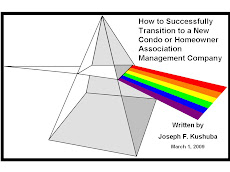 Are you a condo or homeowner association Board that just gets what you get from your Management Company (MC) … not what you want? Is your MC directing their efforts in the wrong direction or their advancing their own agenda? Are they moving too quick or too slow? Are they meeting expectations from key stakeholders and managing ones that are unrealistic? Is your association becoming better each year or is it staying the same, or worse, decreasing in performance? If you are experiencing these problems, it is time to take charge and do something about it. This article discusses a methodology that allows you to take a proactive position with your MC and “drive for results”.
Are you a condo or homeowner association Board that just gets what you get from your Management Company (MC) … not what you want? Is your MC directing their efforts in the wrong direction or their advancing their own agenda? Are they moving too quick or too slow? Are they meeting expectations from key stakeholders and managing ones that are unrealistic? Is your association becoming better each year or is it staying the same, or worse, decreasing in performance? If you are experiencing these problems, it is time to take charge and do something about it. This article discusses a methodology that allows you to take a proactive position with your MC and “drive for results”. Professional property management is a service industry, and some service providers perform better than others. To evaluate how your property's management measures up, it's necessary to assess both how the company functions as a whole and also how your individual managing agent is performing. To do that, it's important first to understand what a really good professional management is supposed to do and then assess whether or not your MC is providing you that level of service. If it is not, then you have identified an improvement opportunity that should be discussed with your MC and addressed.
In most associations, BoD’s think about reasons they hire a MC in terms of what they expect them to do, not in relation to the underlying role they're expecting them to play. In reality, both are equally important. Shown below are typical examples of each type of job responsibilities that may be involved:
Basic Services. These are the services provided that is typically spelled out in an MC contract. They generally contain a further detailed description of what is to be done and the frequency.
- Architectural and environmental standards
- The maintenance of common properties
- The provision of common services
- Internal communications
- Financial management
- General administration
- The procurement of insurance
- The preparation of tax returns and other reports
- Assistance to the Board of Directors on policy matters.
Role of the MC. These example responsibilities are more subtle, but none the less important. They describe expected role and demeanor of the MC. They are often the things that make or break a good MC.
- They are up-to-date on all association issues; delinquencies, foreclosures (pending and otherwise), violations, contracts, etc.
- They report everything to the BoD at our regular board meeting and notify us immediately if something requires immediate attention or of a situation that might become difficult to handle if not dealt with delicately.
- They prepare accurate and timely management reports for our board meetings and alert us to anything that requires attention.
- They always acts in good faith and acts in best interests of the members of the association, while exercising due care and diligence.
- They minimize costs at every opportunity and come up with creative ways for our associations to combat rising costs.
- They treat everyone with dignity and respect in carrying out their duties.
These above services can be considered as the basic “blocking and tackling” that must be performed in the normal course of duty. But, how do “stretch” your MC to above and beyond the call of duty? This can be accomplished with the use of mutually agreed upon objectives that plan for results and not just do the work. Identifying 3-5 objectives each year can provide outstanding benefits and progress over the long term.
MC objectives
Every association will have its unique needs which will drive the establishment of objectives. Some may want to focus on landscaping and some may want to focus on a new association website. Shown below are some typical examples.
- Reduce the operating cost for the association by 10% over the next year.
- Create a new association website in the next six months not to exceed $5,000 in development cost.
- Convert the landscaping irrigation system from well water to lake water by the end of the year.
- Increase co-owner awareness of standards and guideline requirements to improve compliance with condo covenants.
- Contact a tax specialist who operates on a contingency basis and request a quote for appealing this year’s association property taxes.
Using the above three categories of performance, you now have foundation for a performance management and feedback system to be used with your MC. Periodic reviews of their performance should be done to assess how they’re doing and identify both their strengths and areas where they could use improvement. But, before any of this can be used, the Board must fully understand and accept that the MC works for them and not the other way around. The BoD has hiring/firing authority and can eliminate, replace, revise, or renegotiate a contract with a Management Company. If the MC is unwilling to work with the BoD on a method of assessing and improving their performance, then it is time for the Board to look for a MC that will!
There are many different techniques to evaluating management performance. Some do formal annual performance reviews. Some do it twice a year. Others use a 360 degree feedback system where in input of peers/subordinates are built into the reviews. Many of these techniques require considerable time and effort for both parties to provide the necessary documentation. Shown below is a simple process that I would recommend for use. It has received many favorable reviews in my business world experiences. It is by no means the perfect assessment tool or the only one. But, it is effect and it does get the job done in a minimum amount of time. Here how it works.
Recommended Performance Management & Feedback Process
- Using the following templates, create three sheets – one each for Basic Services, Role of the MC, and MC objectives. For each sheet you should list the key responsibilities in the leftmost column.
|
Basic Service |
Do More Of |
Do Same Of |
Do Less Of |
|
|
|
|
|
|
Role of MC |
Do More Of |
Do Same Of |
Do Less Of |
|
|
|
|
|
|
Objective |
Timing |
Results/Status |
|
|
|
|
- Review the sheets with the MC and/or Managing Agent and gain agreement on the accuracy of their responsibilities and the assessment technique to be used.
- Conduct two performance reviews during the year. One at the mid-term time frame and one at the end of the year. The performance review should be more of a discussion rather that a boss rating the subordinate exercise. This is an opportunity to take time out of one’s busy schedule to examine how things are going. It is not necessary to write anything down for these two reviews. You simply use each responsibility as an opportunity to say to your MC, “thing are going great on this item” or “this is an area where we need some additional emphasis.” With this system, there is no actual rating scale. The format reduces the stress level for everyone concerned and allows for a meaningful discussion on things that are going well and not so well. It is also a time for each party to work together and help each other be successful. Of course, the mid-year and end-of-the-year reviews are not the only reviews that should occur. The most effective feedback is when it occurs immediately after the action occurs. So, if the MC does something well, pat them on the back. If they don’t do something well, let them know that as well.
A complete description of this Management Performance and Feedback system and example templates are in available for purchase in electronic form at www.condopresident.com under the downloads section.









No comments:
Post a Comment